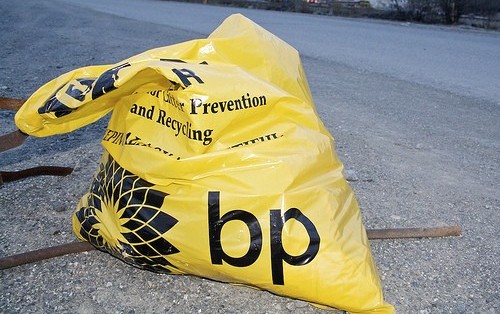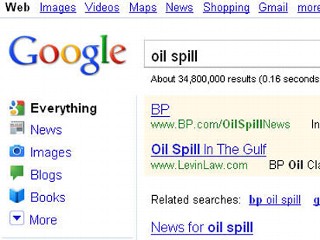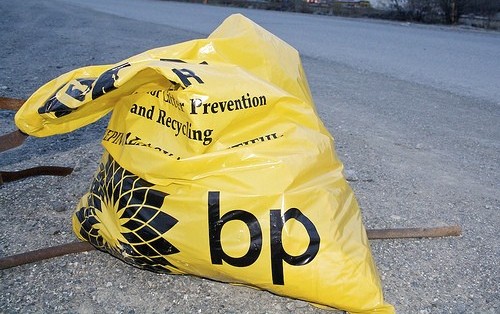 A BP trash bag — not quite big enough to contain its mess.Photo: abrahamhyat via FlickrA little less than a month ago, back before he was madly tripping over his tongue, BP CEO Tony Hayward was sounding almost inspirational as he channeled Winston Churchill: “We are determined to fight this spill on all fronts, in the deep water of the Gulf, in the shallow waters, and, should it be necessary, on the shore.”
A BP trash bag — not quite big enough to contain its mess.Photo: abrahamhyat via FlickrA little less than a month ago, back before he was madly tripping over his tongue, BP CEO Tony Hayward was sounding almost inspirational as he channeled Winston Churchill: “We are determined to fight this spill on all fronts, in the deep water of the Gulf, in the shallow waters, and, should it be necessary, on the shore.”
But, alas, then was then and now is now. These days Hayward and BP are preparing for new battles: They are determined to fight in Congress, in the courts, and on Google.
As sloppy as BP has been with little things like safety and disaster prep out in the real world, the company is one plugged-in player in the land of power and perception.
Money can buy you love: Sure, just about every politician is playing whack-a-mole with BP in public now, but in the halls and restaurants of Capitol Hill, the oil giant has an A-Team in overdrive, reminding members of Congress and their staffs that BP still provides two things their constituents want and need: oil and jobs. It helps, as Laura Strickler notes at CBS News, that BP’s top hired guns in D.C. are no less than Tony Podesta, a cleanup hitter in Lobbyland, and Ken Duberstein, Ronald Reagan’s former chief of staff. Plus, at least 29 of the 43 lobbyists now supporting BP came from the federal government or congressional staffs — including three who used to work for Sen. Mary Landrieu (D-La.). And a BP advisory council includes the likes of former Senate Democratic leader Tom Daschle, former Republican Sen. Warren Rudman, and former New Jersey governor and EPA chief Christine Todd Whitman, as ABC News reports.
Check out this map from Muckety of BP’s lobbying machine.
Let us help you help us: To cover its bases, BP and its employees have already kicked in more than $112,000 to candidates running this year, with 70 percent going to incumbents, Dave Gilson reports at Mother Jones.
First, we hire all the lawyers: Given the amount of time it will be spending in court in the years ahead, BP is not about to give short shrift to the third branch of government. As James Ridgeway points out at Mother Jones:
In addition to having their way with the executive and legislative branches of government, the oil companies have largely triumphed over the judicial system as well. Government policy plays into oil company interests not only by letting them do as they please, but also by limiting their liability when things inevitably go wrong … [BP] has promised to pay for the cleanup. But you can just see the lawyers haggling in court over what constitutes a cleanup cost.
According to an AP investigation, more than half of the federal judges where most of the Gulf spill suits are pending have financial connections to the oil and gas industry. BP is pushing to have the pre-trial matters in all its federal lawsuits handled by a Houston judge who has taken travel money from and given speeches to oil-related groups, Mary Flood reports in the Houston Chronicle. BP also recently hired Jamie Gorelick, a former deputy attorney general in the Justice Department during the Clinton administration.
That’s not oil, it’s patina: Maybe the only thing more toxic than BP’s oil is its image, so the company is spending big to get us to hate it a little less. It hired Hillary Rosen, a former music industry lobbyist and Huffington Post editor, to head up its crisis-management team in Washington. It brought aboard Anne Womack Kolton, a onetime Dick Cheney spokesperson, to handle media relations. And it sought out Purple Strategies, a bipartisan (get it, purple?) corporate PR firm run by a former Bush strategist, Alex Castellanos, and onetime Howard Dean marketing guru Steve McMahon.
 The camera doesn’t lie: But even all those folks haven’t been able to make Tony Hayward more loveable. About 75 percent of viewers surveyed about the recent TV spot in which the BP CEO told America that he was “deeply sorry” felt there wasn’t enough lipstick in the world to dress up that pig, Suzanne Vranica reports in The Wall Street Journal.
The camera doesn’t lie: But even all those folks haven’t been able to make Tony Hayward more loveable. About 75 percent of viewers surveyed about the recent TV spot in which the BP CEO told America that he was “deeply sorry” felt there wasn’t enough lipstick in the world to dress up that pig, Suzanne Vranica reports in The Wall Street Journal.
A search for meaning: Finally, to ensure that no stone is left unturned in telling the BP Story, the company has purchased “oil spill” and other such phrases on Google so its own links show up at the top of search results.
Some legacy, eh?


